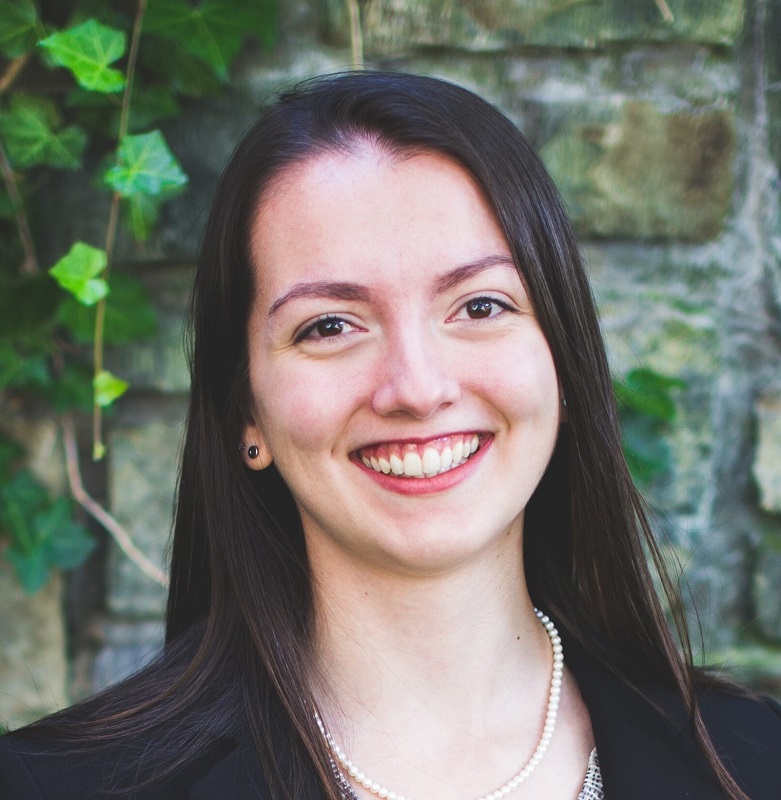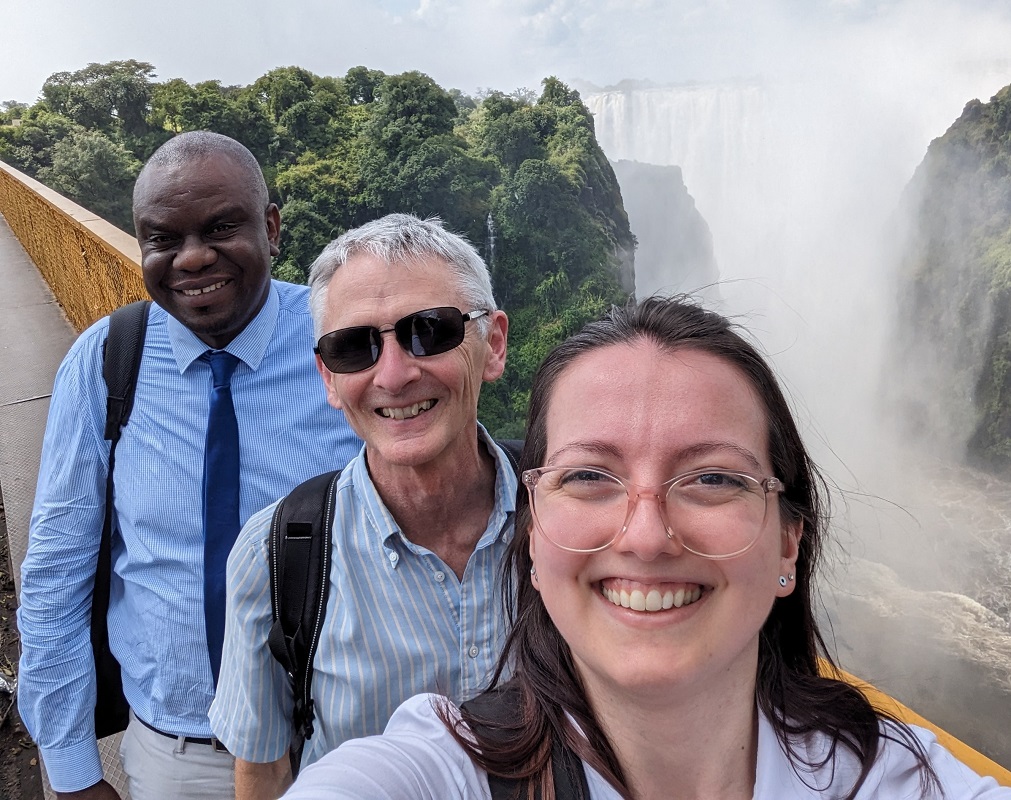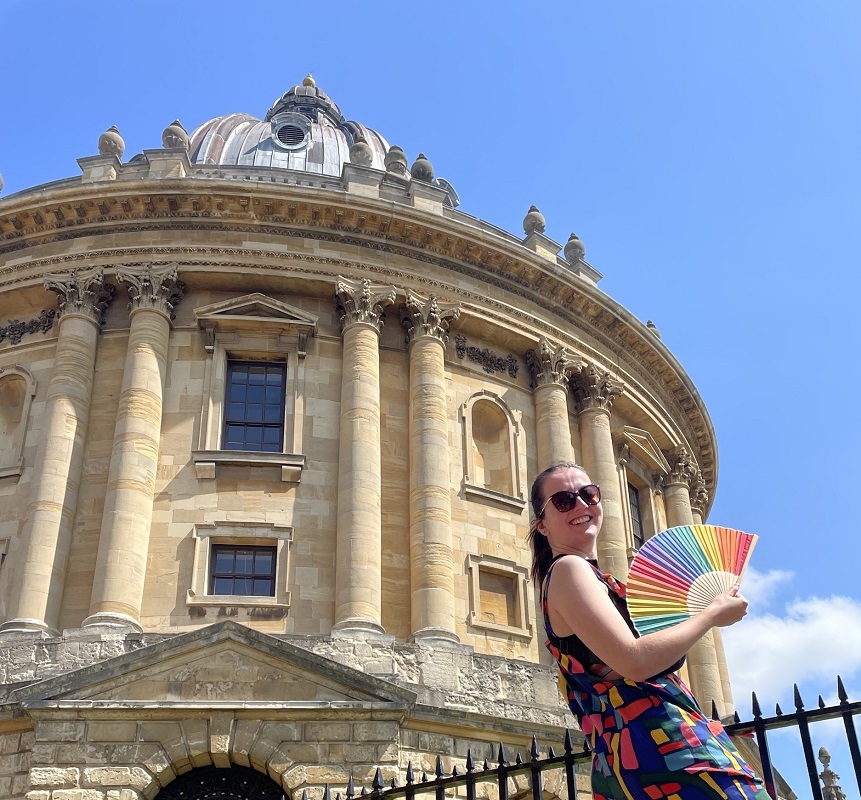Alycia Leonard is part of the CCG team and is based at the University of Oxford. She is Canadian and her first degree was in Electrical Engineering at Memorial University of Newfoundland. She gained her DPhil in Engineering Science at Oxford in 2022, during which time she also played for Oxford’s basketball team, served as president of the basketball club, and acted as equalities representative for the Hertford College Middle Common Room. During her career journey so far, she has taken up several volunteering roles and even spent four months working on an electronic musical instrument called JADE.
Which area of CCG’s work do you focus on?
I focus on the spatial planning of energy systems. What that means is I look at where it makes the most sense to build different types of clean energy projects that can facilitate economic growth. At the moment, I’m mostly looking at cases in Zambia and Kenya with our local partners and doing some work in Ghana as well.

What does that involve?
I look at energy planning in terms of the actual energy systems that provide people with electricity. So, for example, decisions between where a mini grid should go versus where the larger grid should be extended to be most cost effective and serve people best, including giving them the most social benefit. But I also investigate particular kinds of energy intensive economic opportunities.
So, for instance, the opportunity to produce green hydrogen is really being talked about a lot right now among both politicians and energy people as a way to solve some of the issues related to fossil fuels. So, I look at where and how energy can be produced to meet this eventual green hydrogen need, and whether that can benefit low- and middle-income countries in a way that is just and equitable while also decarbonizing some of the higher emitting richer countries in the world.
Do the clients dictate what source of energy they want you to look into, or do they ask for a range of ideas based on your findings?
It really depends on who we’re working with. For instance, we recently did a small project working with the Danish Refugee Council, where they were specifically interested in the technology of mini grids, likely supported by solar in the refugee context, mainly in Africa. In that case, because there was a stated goal and a question of feasibility, we did look only at that technology.
But in other cases, it’s quite a bit more open. We’ve recently been approached about contributing to some rural electrification planning in Zambia on a more provincial scale. That’s much more of an open exercise, asking the question: “given we want to provide energy equitably, what makes sense?” And that’s much more open to interpretation, especially if you’re looking at a full policy type of scope where you’d be looking at a lot more options.
And typically, how long does it take you to do a project like that?
It’s the classic academic answer – it depends. It all depends on what you’re trying to learn and the scope of what you’re working on. If you’re looking at a particular district or sub county, it can be a really quick project that would take just a few weeks to get some really good insights and collect some data. But if you’re doing this more open planning exercise, especially if you need to engage stakeholders – which is critical to these political and policy focused exercises – then it can be months to years. But that’s important because you want to engage everyone in the process.
Are you at the stage yet where you have examples of how your work has been taken on board and implemented by people or is it too soon?
As always in research, these things take time. But we have some initial indications. We’ve been working closely, for instance, with the Ministry of Energy in Kenya for some time now. We’re not just looking at spatial data, but also the spatial social implications. These are really important in Kenya as they’re going into more devolved county-level energy planning. So, we’ve been working to understand that sector, map it out and also understand how gender equality and social inclusion can be better included in that kind of energy planning.
On top of that, we have been in discussions with the Ministry about how our findings can be included in some of the toolkits they’re producing to collect the right data to do this energy planning. It’s still under development because when you’re doing this kind of engagement-heavy work, it takes time.

Tell us more about the social aspects of spatial investigation you mentioned.
There’s a lot that varies throughout an area about how people live. So, we might be looking at a rural area or an urban area. If you’re looking at an economic opportunity, what does the current employment in this area look like? Is there availability of people who could be reskilled into a green economy, or who could transition their current employment to become greener? That kind of thing.
As well as job creation, you’re also looking for community benefit. If you’re looking at something like green hydrogen and you’re implementing a whole package of new renewable generation for that economic opportunity – that’s great, but is it also electrifying nearby communities? How you can spend slightly more to get majorly more social benefit is something we’re really interested in when you’re looking at these large-scale economic projects that can use green energy.
And how responsive do you find your clients to that inclusion agenda? Is that something that they are proactively asking for or is it something CCG suggests?
A bit of both. I think that a lot of people find the inclusion agenda interesting; they speak about it but sometimes don’t know how to implement it practically. And so a lot of what we get involved with is asking what data collection tool they actually need and what kind of disaggregation they need to do with their data. For example, we need to look at disabilities, we need to look across classes, and then at how all those things vary spatially as well because, depending on where you are, the culture treats different groups differently. So we try to contribute a lot into that space as well.
Are you working with existing data on, for example, the number and whereabouts of people with disabilities, or are you having to collect that from scratch?
There is a lot of good existing data that we try to work with, within things like censuses, and that includes these ‘markers of inequality’ as we sometimes call them. But it’s about sub-setting the data into these groups and analysing how the energy needs and other developmental needs vary across and within these groups.
We do our own kinds of data collection as well. For instance, something that isn’t often available is some of the more underlying information about, the emotional or intangible motivations behind the material needs that they express. That aspect is under-documented and if you’re trying to implement these kind of holistic development solutions, you need to account for that as well.
Once we have worked out how to collect different types of data, we hope to provide some kind of toolkits around how that can be done by others locally in the future.
Moving on then, what would you say have been the highlights of working with CCG so far?
Wow, that’s a hard question, there’s a lot of good stuff. I mean just right from day one, the ability to be in such close engagement with collaborators and decision makers, like policymakers in the countries where we work, is such a special environment to be in.
I don’t know of many other research projects where, as a junior researcher, I would be able to gain this kind of experience and be able to learn from these people who are actually embedded in these contexts. I don’t want to come in as an outside expert, and CCG is really not like that – we’re very collaborative. So I feel like I’ve had such an opportunity to learn from the decision makers in the countries we work in, which has been amazing.
Also, on a personal level, something that’s been really rewarding recently is the opportunity I’ve had to do a joint Southern Partner Fund project with an amazing academic at Strathmore, Lucy Nguti (also interviewed for this series). We had such a good collaborative experience, co-creating the aims of that project, and collecting really incredible new data about how entrepreneurs are tackling climate change and climate adaptation issues. That’s been really rewarding.

Great. Let’s go a little further back now; tell me about choosing to study electrical engineering at university for your first degree.
Thankfully, I came from a family that really valued STEM in general, both my parents were teachers. My dad was a math and science teacher, and mom was a French teacher, and growing up I favoured both languages and sciences. But getting towards university, I chose science and initially applied to study physics as that seemed interesting and I liked it at school. But towards when I was about to start university, I really started to notice that there was something missing. I really wanted to do science, but I also wanted it to impact people; I wanted to be able to do something that helped people in some way, even though I was doing kind of ‘hard’ science.
So yeah, that led me to engineering. In my first year I didn’t have to choose which type of engineering to do and in my second year I chose electrical because I liked the magic of it. It’s the hardest to see and it’s like sorcery; we know that there are electrons, and the sun causes waves and particles to move, and we can’t see any of it, but it lets us do so much. I found it really fascinating.
Brilliant. Where did the extra element of wanting to do something to help people come from, would you say?
My parents were teachers and I think they encouraged us towards something a little bit more about giving something back, I mean I was always involved in volunteering going through school. I was on my schools Peace and Justice Committee and Gay Straight Alliance and all that kind of thing. I care about and it’s just part of the values I grew up with.
It’s a little weird, though, because I never had any engineers in my direct family and also didn’t have any family working in any kind of sustainable development space. I went that way through Engineers Without Borders when I started university, I got involved with my university’s chapter of that organization. I realized that it was a good route to specialize in how I could use electrical engineering in a sustainable and impact-focused way.
The first time I really did any major global exploration was I was in my co-op undergrad programme, which meant that every four months I had the chance to do four months of work between my school terms. And for those internships I worked in different places and for my third one I did a placement with a data for development company based in Kumasi in Ghana. I lived in Kumasi for four months and worked for a company that’s called Viamo now. That really started to spark my interest in the area of data-driven development work I’m in now.
Stepping outside your work for CCG for a moment, what’s your personal take on the climate crisis?
That is tough. I think so much of the power and what is constructing and maintaining the climate crisis, is out of the hands of the general people. I think anyone could guess what I’m going to say: if we don’t vocalize what we want in terms of the climate in some way, then it’s never going to change because a lot of the capitalist structures that we’re under do not put a cost on destroying the environment at present, and that’s a whole area of research, right? There are lots of people that I work with who are interested in things like carbon pricing and pricing the value of destroying ecosystems. Historically and until now, those things still haven’t been properly priced.
Unless consumers and voters speak with our dollars and our voices and our actions and our votes to get people into power who want to implement those systemic changes, it’s not going to happen. I do worry about younger people not voting as much and not being so involved politically as older generations.
I think if we could somehow convince every young person to use their political agency, the balance would change quite quickly, and a lot of global issues would improve. And I hope that someone figures that out; I’m trying my best, but I don’t know the answer.
That’s a really good answer. Let’s just follow on from that and talk about what you would say to young women who want to make a difference in the Climate Change sector?
We haven’t talked so much here about facing barriers as a woman, but at the time I did electrical engineering, I was one of only three women in a class of 30, so definitely experienced the whole being the only woman in the room thing.
I think what I’ve found is that it’s all about the culture of the place you’re in. Of course, I was initially intimidated in these first-year engineering lecture halls with 250 people and you’re afraid that if you raise your hand and you’re wrong, you’re not going to be perceived as wrong because you’re wrong; you’re going to be perceived as wrong because you’re a woman, and someone will attribute that error to your entire gender.
As I continued to go through the degree, I found that the people who were around me, were phenomenal people. There ARE men who want to support women in STEM, and you might need to look hard because not all men are going to be huge champions. But if you look for them, they are there. If you can get them on your team, then life becomes much easier.
Once I had established that support system, then it stopped mattering so much. I guess it also stopped mattering because – and it sucks that we have to do this but – I proved that I was good, you know? A mediocre man doesn’t get the same perception as a mediocre woman in a lot of these spaces but if you’re a woman and you can show that you’re good, you’re in.
So, I would say, if you’re a young woman trying to get involved in engineering specifically, yes, it is in many contexts, still male dominated. However, if you can get past that stage of fear, you’ll find a team of supportive people, both men and women, within your educational system, that will have your back and take you on your merits.
And why do you think it’s important that more women get into these male-dominated areas or do get into climate change and the addressing of those issues?
Well, we are socialized as women to perceive ourselves in a more caring role, right? And men are socialized to perceive themselves in a more technical role. And I think being someone who can speak to both sides is so incredibly important because these climate change and renewable energy issues aren’t just about caring or just about technical feasibility. You need to be able to perceive what the community needs, like when you’re implementing a huge infrastructure project. You need to be able to understand the social benefits and the social impacts of the infrastructure you’re modelling. You need to be able to understand what the actual human implications are of these huge societal changes. I think it’s a hugely valuable skill set.
In my own experience, being someone who speaks both social impact and technical modelling is rare. I think a lot more women would come to that skill set and naturally, because of the way that they’ve been socialized to perceive themselves as caring. Similarly, I guess men who take upon it in themselves to get into that more caring mindset could equally bring the same kind of perspective.
It’s that combination of things that’s important, not a person’s gender per se.
Yes, and as a woman you have that kind of perspective in-built by society to a certain extent.
That’s a really good answer.
Thank you so much for your time; it’s been fascinating listening to you.
